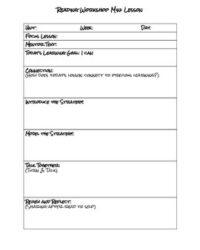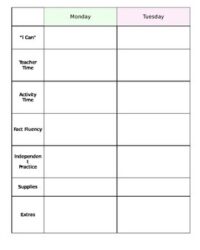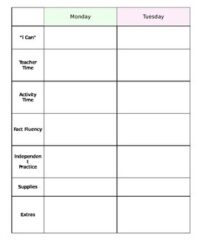Have you ever found yourself staring at a blank page, trying to conjure up a compelling reading lesson that truly engages your students? If you teach reading, especially using the Readers Workshop model, you know the power of structured yet flexible instruction. It’s about empowering young readers to grow, make choices, and develop lifelong literacy skills. But making that magic happen consistently, day after day, requires thoughtful preparation. This is where a well-designed readers workshop lesson plan template becomes your absolute best friend.
Instead of reinventing the wheel every single time you plan, a robust template provides a consistent framework, ensuring all the essential components of a powerful reading lesson are addressed. It helps you focus your energy on the content and student needs, rather than on the organizational structure itself. Think of it as your reliable co-pilot, guiding you through the often-complex journey of literacy instruction, making sure every lesson is purposeful and every minute with your students is maximized for learning.
Unpacking the Core Components of a Powerful Readers Workshop Lesson
At its heart, the Readers Workshop model is designed to foster independent, thoughtful readers. Each lesson within this framework typically follows a predictable structure, allowing students to internalize routines and focus their cognitive energy on the reading strategies being taught. Understanding these core components is crucial before you even begin to think about populating your readers workshop lesson plan template, as they form the backbone of effective instruction.
The lesson usually kicks off with a “mini-lesson,” a brief, focused period (typically 5-15 minutes) where you introduce a specific reading strategy, skill, or concept. This isn’t a long lecture; it’s a concise demonstration, often using a read-aloud or a text students are familiar with, to model what thoughtful readers do. The goal is to provide a clear, actionable takeaway that students can immediately apply to their own reading. After the mini-lesson, students transition into independent reading, which is the longest and arguably most important part of the workshop.
During independent reading, students apply the strategy from the mini-lesson, practice previously taught skills, and engage deeply with self-selected books. This is a time for genuine reading mileage and critical thinking. While they’re reading, you, the teacher, are actively circulating, conferring with individual students or small groups. These conferences are powerful opportunities for personalized instruction, allowing you to assess student progress, provide targeted feedback, and nudge readers towards deeper understanding. It’s a chance to meet students exactly where they are and provide just-in-time support tailored to their specific needs and struggles.
Finally, the workshop concludes with a “share” time. This brief period brings the class back together, often for students to share how they applied the day’s strategy, discuss a challenging part of their reading, or celebrate a reading success. The share can reinforce the mini-lesson, highlight effective strategies used by peers, or simply build community among readers. It’s a moment for reflection and consolidation, helping students internalize their learning and see themselves as part of a larger reading community.
Key Elements to Consider for Each Section
- Mini-Lesson: What specific strategy or skill will you teach? What text will you use for modeling? What will be your clear teaching point? How will you demonstrate it?
- Independent Reading: What will students be doing? What are your expectations for their engagement? How will you monitor their progress?
- Conferring/Small Groups: Which students will you meet with? What specific teaching points will you address? What data will you collect?
- Share: How will students share their learning? What questions will you pose to facilitate discussion?
Crafting Your Own Readers Workshop Lesson Plan Template
Now that we’ve explored the foundational components of a Readers Workshop lesson, let’s talk about putting it all into a practical, usable format. Creating your own readers workshop lesson plan template isn’t just about filling in blanks; it’s about designing a tool that streamlines your planning, ensures consistency, and ultimately enhances your instruction. The beauty of a template lies in its adaptability – you can customize it to fit your specific teaching style, grade level, and curriculum needs, making it truly yours.
When you sit down to build your template, think about what information you consistently need to jot down for each lesson. This includes the general logistics, like the date and unit of study, but also the more granular details that guide your instruction. Consider sections for your learning objectives, the specific teaching point for your mini-lesson, materials needed, and differentiated instruction notes. Having dedicated spaces for these elements ensures you don’t miss a beat and can quickly reference crucial information during your lesson delivery.
A well-structured readers workshop lesson plan template serves as a comprehensive guide. It helps you articulate your “why” for each lesson, visualize the flow of your instruction, and anticipate student needs. By consistently using the same template, you create a rhythm in your planning process, freeing up valuable mental space to focus on the nuanced art of teaching reading. It’s an investment in your planning efficiency that pays dividends in more effective, engaging lessons for your students, truly transforming your teaching practice.
Essential Sections for Your Template
- Date and Unit/Module
- Teaching Point (Mini-Lesson Focus)
- Learning Objective(s)
- Materials Needed (Texts, Anchor Charts, Supplies)
- Mini-Lesson Script/Outline
- Independent Reading Activity/Expectations
- Conferring/Small Group Focus (Names of Students, Specific Goals)
- Share Plan (Prompt, Expected Responses)
- Differentiation Notes (Support for struggling readers, challenges for advanced readers)
- Assessment/Observation Notes
Implementing a clear, consistent planning system for your Readers Workshop can truly transform your teaching experience. It shifts your focus from the administrative burden of lesson preparation to the exciting task of fostering a love for reading and developing strong literacy skills in your students. By having a reliable framework in place, you gain confidence and clarity, allowing you to be more present and responsive to the readers in front of you.
Ultimately, a well-utilized template empowers you to deliver purposeful, engaging lessons that build a strong foundation for lifelong reading. It’s about creating a supportive and predictable environment where every student feels equipped to embark on their unique reading journey, knowing they have the tools and guidance to succeed. Embrace the structure, and watch your readers flourish.


